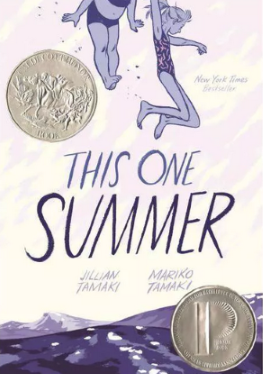…one we shouldn’t keep our kids from taking.

There was a lake, a girl (my friend), some boys (not my friends, but maybe?), and a long, thick rope extending from a tree branch. The kids bobbed in the brown water, waiting for me to summon the courage to swing from that rope and launch myself over their heads.
The cover of Jillian Tamaki and Mariko Tamaki’s graphic novel This One Summer, which distills the magic and terror of preadolescence into 320 stunning pages, captures two girls who seem to have found that courage — or still have the innocence — to leap into a sun-splashed lake.
But as childhood turns into adolescence, we’re making other leaps, too. For me, I was wishing one of those boys might want to kiss me. For Rose and Windy, the girls who see each other at Awago Beach every year, they’re curious about the teens working (and drinking and kissing) near the area’s little convenience shop.
It’s the drama surrounding those young adults that has made this novel one of the top banned books since it came out in 2014 and, crucially, received a Caldecott honor. The teens curse freely, talk about sex, and seem to have sex, at least judging by the central conflict between an apparently pregnant girl and her boyfriend.
Rose and Windy watch it all, captivated. For Windy, it’s like a TV show, but Rose’s interest is complicated by the unacknowledged crush she has on the boyfriend. For both girls, they’re realizing that the childhood pleasure they used to get from summer vacation isn’t quite sufficient anymore.
When I first read this book, I couldn’t understand what might’ve attracted any censorship at all. There’s the (sweetly validating) implication that Windy is queer, and certainly there are lots of bad words. But the story captures perfectly that suspended sense of plunging into adolescence, with its realization that the world is more complicated than childish play can encompass. More complicated but maybe also more fulfilling.
According to the Comic Book Legal Defense Fund, many libraries assumed the Caldecott recognition marked This One Summer for elementary-school readers, as the honor has often gone to books aimed at those kids. But it can be given to any book whose audience includes children aged 14 or younger. In 2016, the shocked mother of a surprised third-grader pushed his Florida school to take the book off its library’s shelves. From there, high schools followed suit.
Authors (and cousins) Tamaki and Tamaki have acknowledged that they didn’t intend their book for grade-schoolers but rather young readers. I can see why an 8-year-old might snicker at a character who calls her deadbeat boyfriend a “douchebag with a penis,” though I’m willing to bet real money that such a kid has no idea what a douchebag is.
But for a child to encounter that line, they’d have to have gotten through nearly 300 pages of a narrative mostly about two girls discovering the contours of growing up by playing at the beach, watching horror movies they’re too young for, and wondering why Rose’s parents are so upset at each other. That’s the choice (and time commitment) a young reader would be making.
And here we get to the crux of book banning: A ban is an assertion of control, an assumption that one party knows better than the group of readers they’re trying to protect. Yes, as parents, we hope to protect our children, and maybe it makes sense not to encourage an 8-year-old to read a book about 19-year-olds and disputed paternity. But perhaps there are kids who want to read those stories, who might even need them. Certainly, I could’ve used this story when I was 12 and wondering what lay beyond the curtain blocking my view of adulthood.
The bans, in other words, aren’t about the books. Not really. They’re about parents afraid of the world, afraid of relinquishing control of their children’s environments and letting them see that world in all its beauty and its horror.
I empathize with that. I don’t want my kids to dwell on their mortality or the stresses of adult life that await them. But just as childhood is about finding the courage to grab that rope, to pull back that curtain, to step into the reality of adulthood with as much poise and preparation as possible, parenthood is about providing the catalyst for that growth. We withdraw our hands, let our children explore, and, yes, sometimes fall.
I gave This One Summer to my 11-year-old because I thought she might appreciate its hints of queer awakening. But those hints were so subtle that she missed them, and she returned the book disappointed. She told me she didn’t like the story because it was icky (my word). But when I asked if she wished she hadn’t read it? No. She was still glad she did.
When I reread it, yes, I was uncomfortable imagining my kiddo reading the curse words (“fucking asshole”) and the talk of sex. But those things are in the world, and isn’t reading a story about a preteen watching but not quite understanding the world the perfect introduction to all that mess? Isn’t that, in the end, what books are for?
Leave the books on the shelves. Let the kids find them. Let them grab the stories and leap, giddy and scared, into the lake. We can be brave enough.
Carrie Callaghan is the author of the historical novels A Light of Her Own and Salt the Snow. She lives in Maryland with her family and four ridiculous cats.

